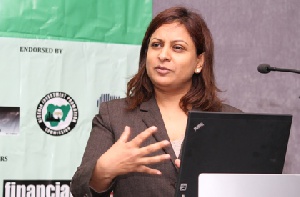 Razia Khan, Chief Economist for Africa at Standard Chartered Bank
Razia Khan, Chief Economist for Africa at Standard Chartered Bank
The Chief Economist for Africa at the Standard Chartered Bank, Razia Khan, has advised Ghana against any attempt to allow the cedi to fall to what some consider to be “its true value,” warning that it could drive up the country’s debt to GDP ratio.
“The numbers we are seeing speak for themselves, and it says that: no Ghana, whatever you do, don’t allow the Ghana cedi to weaken,” she told the B&FT in an interview.
“This is because it would drive up the debt to GDP ratio. The point is much more about the extent of external debt that has been taken on by Ghana. It is for very good reasons; it is cheap to borrow in dollars for big infrastructure projects that need to be invested in. External borrowing has also helped the country’s exchange reserves but it does create vulnerability.
This means the choice to allow for market forces to drive the Ghana cedi weaker isn’t necessary there because of the other implications that it would have on the public debt and public debt management,” she said.
Ghana, she said, finds itself in a very difficult situation, having taken on a great deal of external debt. For any country in that situation, she explained, there is the realisation that anytime the cedi weakens, it would have a negative impact on the public debt ratio.
“When you borrow in external currency, any amount of cedi weakness will inflate the amount of external debts in local currency terms.”
Her comments come in the wake of calls by some economists and industry players for managers of the economy to allow demand and supply to determine the strength of the cedi until it reaches its equilibrium.
According to them, government will have a better appreciation of the real strength of the cedi if it is allowed to fall to its normal level as that is expected to allow the government ample time to invest in productive sectors of the economy to improve the cedi’s worth.
In an article titled: ‘Let the cedi fall,’ in the May 9, 2017 edition of the B&FT, Kenneth Thompson of Dalex Finance, argued, for example, that “the effect of an overvalued currency on our economic development is substantial because imports are made relatively cheaper compared to local production.
As such, it is much cheaper to import white Thai perfumed rice than to purchase the rice produced locally. The imported wig from China is so much cheaper than that from the wig factory on Spintex Road.”
Ensuring stability of the cedi has been one of government’s biggest headaches, and according to the central bank, foreign exchange market conditions remain stable supported by improved liquidity conditions, the trade surplus and increased reserves.
From January to June 2017, the cedi depreciated by 3.7 percent against the US dollar, compared with a depreciation of 3.3 percent in the same period of 2016.
The nominal effective exchange rate and the real trade weighted exchange rate both depreciated marginally but remain broadly stable.
But Chief Economist for Africa at the Standard Chartered Bank Razia Khan told the B&FT that, for a country that is trying to achieve debt sustainability, this is very difficult and that allowing the cedi to fall is not an option at all.
“Right now, what Ghana needs to do is to show that it is bringing the public debt to GDP ratio down and the best way to do this is through GDP growth.
Where the denominator in that equation will grow faster than the numerator which will help the country achieve a primary surplus, achieve debt management reforms, bring down the cost of debt service and if your GDP is growing, then you are in a really good place.”
Budget implementation over the first half of 2017 remained broadly in line with the set targets. Fiscal operations in the year to June 2017 resulted in a deficit of 2.7 percent of GDP, within the set target of 3.5 percent and financed mostly from domestic sources.
The improved fiscal outturn was attributed to expenditure constrains within revenue flows.
The total public debt at the end of June 2017 stood at GH¢138.4 billion (68% of GDP) from GH¢122.6 billion (72.5% of GDP) at end 2016.
The total stock of the domestic debt stood at GH¢63.7 billion (31.3% of GDP) and the external debt was GH¢74.6 billion (36.7% of GDP).
The increase in the debt stock was on account of issuance of long-dated domestic bonds in line with government’s debt management strategy of re-profiling the public debt as well as extending the yield curve.












